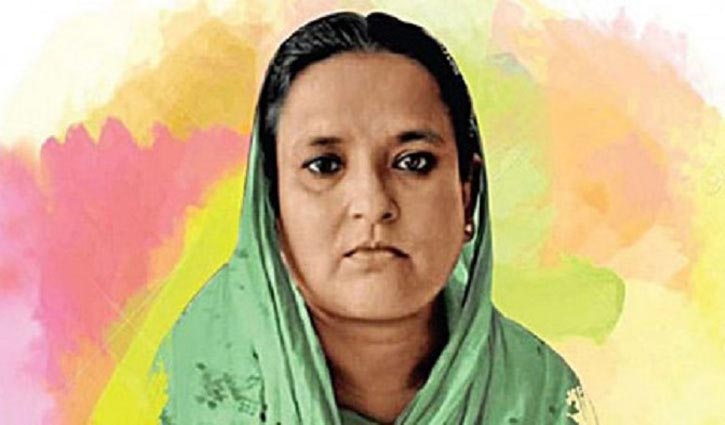Paragraph: Sheikh Fazilatunnesa Mujib
Sheikh Fazilatunnesa Mujib
It is said that behind every successful man, there is a virtuous woman. For our father of the nation, Bangabandhu Sheikh Mujibur Rahman, the woman behind his success was his wife, Begum Fazilatunnesa Mujib. Begum Mujib (also named as Renu) was born in Tungipara of GopalGanj district in 1930. Her early schooling was in a missionary school, followed by religious education at home. She lost her father and mother at the age of five and was groomed by her future mother-in-law. She was married to Sheikh Mujib at the age of eleven and had three sons and two daughters. This lady had not only looked after the family but had also lent her hand in keeping the Awami League organised. During hard times, she never expressed her worries or dismay. Instead, she encouraged and frequently advised the leaders and party men on how to proceed in times of trouble. His house had no luxurious fixtures and fittings. It was an ordinary man’s house. If Mrs. Mujib had desired, being the wife of a president, she could have anything she wanted, but she was not like that. It may be worth mentioning that Mrs. Fazilatunnesa Mujib sold her jewellery for collecting the money for the war of independence. Sheikh Fazilatunnesa was an excellent homemaker. She groomed her children to be good citizens and worthy children of a great father.
Or,
It is said that behind every successful man, there is a virtuous woman. For our father of the nation, Bangabandhu Sheikh Mujibur Rahman, the woman behind his success was his wife, Begum Fazilatunnesa Mujib. Begum Mujib (also named as Renu) was born in Tungipara of GopalGanj district in 1930. Her early schooling was in a missionary school, followed by religious education at home. She lost her father and mother at the age of five and was groomed by her future mother-in-law. She was married to Sheikh Mujib at the age of eleven and had three sons and two daughters. The new generation, which did not see the war of independence or encounter such hardships, will never understand how and in what magnitude Begum Mujib had contributed towards the freedom of this nation. Sheikh Mujib was a born politician and had spent most of his life in jail. This lady had not only looked after the family but had also lent her hand in keeping the Awami League organised. During hard times, she never expressed her worries or dismay. Instead, she encouraged and frequently advised the leaders and party men on how to proceed in times of trouble. His house had no luxurious fixtures and fittings. It was an ordinary man’s house. If Mrs. Mujib had desired, being the wife of a president, she could have anything she wanted, but she was not like that. It may be worth mentioning that Mrs. Fazilatunnesa Mujib sold her jewellery for collecting the money for the war of independence. Sheikh Fazilatunnesa was an excellent homemaker. She groomed her children to be good citizens and worthy children of a great father. Not only that, she was also courageous, determined, painstaking, and a true and ideal daughter-in-law.
Or,
Sheikh Fazilatunnesa Mujib is not only a name of love and respect but also a history. She is a great woman in the history of Bangladesh. She was born on 8 August in 1930 at Tungipara in Gopalganj. Her nickname was Renu. She was the dear wife of the Father of the Nation Bangabandhu Sheikh Mujibur Rahman. She had motherly love and affection for the people of our country. And her sacrifices in all movements, specially the Liberation War of Bangladesh make her Bangamata to us. Having no demands of her own, she led a very simple life. She was the First Lady of Bangladesh. But Bangabandhu’s Renu had no pride and did not want luxury. Gradually, she became a nation maker along with Bangabandhu. In all difficult situations, she always encouraged Bangabandhu to do good for the country. Whenever we speak about Bangabandhu, the name of our Bangamata instantly comes to our mind. She contributes to become Mujib from Khoka, Bangabandhu from Mujib and finally Father of the Nation from Bangabandhu. She never pulled him back and never thought of her own interests. She played a very important role in the six point movement. She walked in the streets with leaflets to inspire the people in the six point movement. She supported him to participate in the General Election in 1970. Bangamata inspired Bangabandhu to deliver the historic 7 March Speech in 1971. After the War of Liberation, she spoke to the heroines “I’m your mother.” On 15 August 1975, the most tragic event in the history of Bangladesh took place. On this very day she laid down her life along with Bangabandhu, their three sons and some close relatives. As Bangabandhu and Bangamata worked together to build a happy and prosperous “Sonar Bangla” she will remain unforgettable in the hearts of our people.

